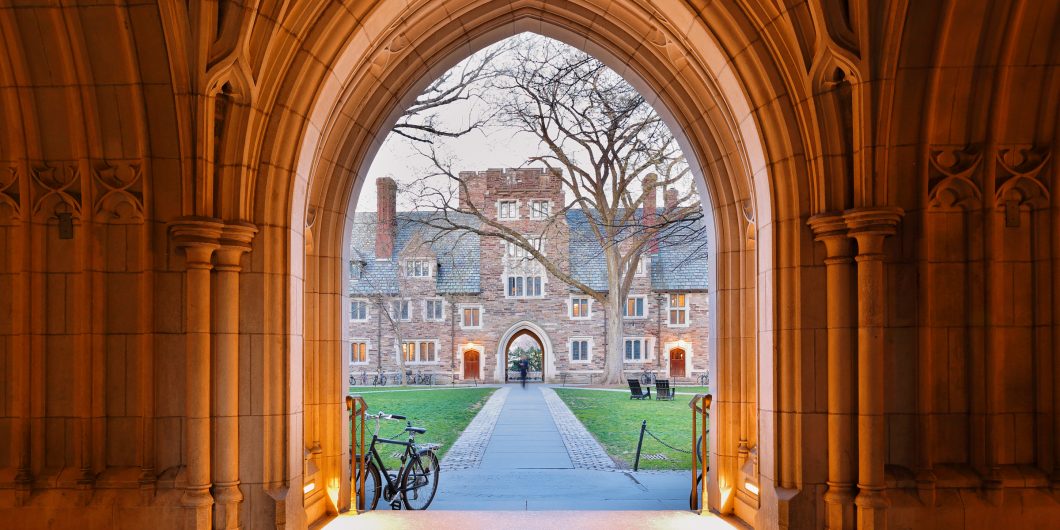Living in the “correct” cultural context, often in poverty, is apparently better for orphaned children than having loving, but white, American parents.
Calling Princeton's “Anti-Racist” Bluff
Last Thursday, the Department of Education (DoE) sent a letter to Princeton University President Christopher L. Eisgruber to inform him that the University will be under investigation for possible violations of Title VI of the Civil Rights Act of 1964. Fifteen days prior, Eisgruber had released a letter to the University community stating, among other fashionably self-deprecatory things, that, “Racist assumptions from the past… remain embedded in structures of the University itself.” Eisgruber also reiterated how he had charged his cabinet back in June with “develop[ing] plans to combat systemic racism at Princeton and beyond.” But Eisgruber’s confession of “systemic racism” at Princeton is not, he stresses, racism actually intended by current actors. It’s part of the “system,” baked into how it operates. Calling it out does not mean that Eisgruber or really anyone else should be judged guilty for racism. The DeVos DoE, however, apparently doesn’t understand that systemic racism accusations are typically an elite institutional tool to both convict and remove yourself from guilt. They instead took Eisgruber and Princeton at their word.
Faced with such remarkable declarations and bureaucratic motions from the head of one of the nation’s most prestigious institutions, the DoE had no choice but to act on the investigative trolling opportunity of a lifetime. Institutional racism, even as it becomes something expected of people in positions of power to confess with ritual solemnity, remains the crime it has been for the past half-century, and now the federal government will go searching for evidence of that crime at Princeton. The lesson? There is a price to be paid when leaders lie.
We begin with a few obvious, if unpopular, truths. Unlike in the past, here in 2020, Princeton as an institution does not have a racism problem, “systemic” or otherwise—not, at least, on any conventional or reasonable understanding of the concept of racism. How do we know? As recent graduates from the University, we’ve lived, worked, studied, and socialized in Princeton for much of the past four years. We know the place (it’s a great small town), and we have interacted with many of the key players, including on multiple occasions President Eisgruber. And yet for all of the many faults we have discovered within the University, we must insist that anti-black racism is simply not one of them. Not at all.
Princeton is rather in many ways an example of a thriving, inclusive, and diverse intellectual community—made up of bright, genuinely curious students and professors from many different walks of life and worldviews—working toward the shared goal of a better world, in line with the University’s unofficial motto of “In the nation’s service and the service of humanity.” Much of Princeton remains, however, caught up in the abject moral panic over systemic anti-black racism that is plaguing our society, sending well-intentioned progressives turning over every ivy-covered stone in the fervent hopes of uncovering racists and other latter-day-witches for prompt and public identification, “education,” or cancellation.
As cultural observers and Princeton graduates committed to seeking the truth, we have a duty to speak plainly about what’s going on here. President Eisgruber has capitulated to the groundless demands of a perhaps well intentioned but ultimately deluded segment of his constituency and of our society. Modern-day, third-wave antiracism, according to John McWhorter, is nothing short of a fideistic religious movement born of an ideological conviction in the presence of significant numbers of problematic racists—and racist structures and disparities sustained by the complicit—in all corners of society, including elite academe. With this and other articles of injustice taken on faith or under duress, concerned students, administrators, and faculty demand that the war against the racists continue. But Betsy DeVos’ DoE has taken Princeton’s admission of racist guilt on its own terms, so by the very logic of its self-indictment Princeton could now face legal consequences. On this front, we absolutely concur with the Editorial Board of the Wall Street Journal: “It will be fascinating to watch how Princeton squares its admission of systemic racism with its vow that it doesn’t discriminate.”
In facing his woke critics, President Eisgruber chose the easy lie, and now his institution will suffer the consequences.
We should like to point out, however, that internal and left-cultural pressures will make it difficult for the University to walk back this latter claim. Will Princeton be able to thread the needle, as Jonah Goldberg observed, and say on racism: “take us seriously but not literally”? Princeton is swept up in, and in an ersatz return to its ministerial roots has served as something of an educational hub for, the Great Awokening. On July Fourth of this year, for example, several hundred Princeton professors and graduate students signed an open letter asserting that “Anti-Blackness is foundational to America” and calling for (among many, many other things) the prompt establishment of an anti-racist commission to “oversee” (read: ideologically censor) scholarly research at Princeton. While it later came to light that some of the signatories actually did not support some of the letter’s most anti-liberal and speech-chilling provisions, the episode nonetheless revealed which ideological interests hold the real agenda-setting power on campus, and who feels beholden to signing what. This helps to explain why President Eisgruber would adopt similar, albeit relatively toned-down (if still absolutely mistaken), “anti-racist” language in his own subsequent remarks to the University community, including his letter of September 2nd.
President Eisgruber is in an unfortunate, yet altogether understandable executive bind. Anti-racist activist types are now a significant, and vocal, constituency within the University community. But based on the little we know of President Eisgruber personally, we suspect that his private views on these matters are likely much more nuanced and much less fervent than those of the clamoring “anti-racist” voices he is forced to respond to. We understand that President Eisgruber has an obligation, as the head of the University, to engage with this particular constituency and to try to allay some of their concerns. Is it unthinkable for Eisgruber to convene authentic discussions with concerned groups about the merits and facts of systemic racism as it regards the operations of Princeton University?
Rather than defend the real merits of the institution which he heads, President Eisgruber has chosen to drift with the prevailing winds of unfriendly, uncharitable, and unreasonable criticism. He has with his actions and words bought into—by failing to challenge—the ridiculous premise that Princeton is in any significant way contributing to or responsible for the injustices, unrest, and frustrations surrounding the issue of race that still plague our nation. In facing his woke critics, President Eisgruber chose the easy lie, and now his institution will suffer the consequences.
How will this end? First of all, we should note that when we report that Princeton doesn’t have a racism problem, we do have one caveat in mind. President Eisgruber’s public hand-wringing was obviously meant to speak to concerns, irrationally endemic within the University community, that the University in systemic fashion engages in anti-black racism and adverse discrimination against people of color. Based on our experiences living, studying, and otherwise existing within Princeton over the past four years, we expect that very little of this will be found. What the DoE might well find, however, and what they might truly be searching for, would be real discrimination on the basis of race, but of an altogether different sort. See the current federal civil rights cases regarding admissions practices at Harvard and Yale, over allegations of bias against Asian-American applicants.
This episode has broader cultural and political implications as well. President Eisgruber’s wish to avoid conflict with constituents to his left has made this yet another missed opportunity to advance productive dialogue concerning issues of race. The anti-racist rhetoric we’ve seen splashing across op-ed pages, Twitter feeds, and streetscapes this past summer has many excesses, and is desperately in need of a strong dose of reality and good-faith grappling with criticism. By engaging with his institution’s influential and vocal anti-racist bloc rather than kowtowing to them, President Eisgruber could have provided that faction—and our national discourse—with a strong dose of the medicine they so badly need. A real reckoning with truth about race would entail factual nuance and debate—not relentless dogma.
President Eisgruber could have brought this medicine home, and thereby contributed to a genuine racial and political healing grounded in dialogue—something beyond the elite navel-gazing and mass uprising which have dominated the past few months. Such dialogue would focus less on elite-level insecurities and more on the most substantial barrier to legitimate racial equity in the United States of America today: the persistence of intergenerational black poverty. This “reckoning” would entail earnest, facts-based discussion and action geared towards reforming our criminal justice system, supporting flourishing black families and communities, and connecting black Americans with better vocational and educational opportunities (which would likely entail crushing the undue influence of teachers’ unions and public sector bureaucracy).
The way forward for a veritable and equitable reckoning about race would be defined by a commitment to facts, pragmatism in policymaking, and adherence to fundamental principles such as the inherent dignity and capability of the individual, regardless of his or her skin color. It will not be marked by the sort of rote and misleading self-condemnation which President Eisgruber put on display in his letter and for which he is being rightly chastised.
Institutions like Princeton, which ostensibly are committed to truth-seeking and the production of useful knowledge, are well positioned to play a crucial role in the racial reconciliation we actually need—which, unfortunately, is not the one we’re getting. We can only hope that after a lawfare induced wake-up call, Princeton and its peer institutions will stop their feigned self-flagellation and live up to their potential to facilitate truthful, helpful, and productive conversations about race in America.



